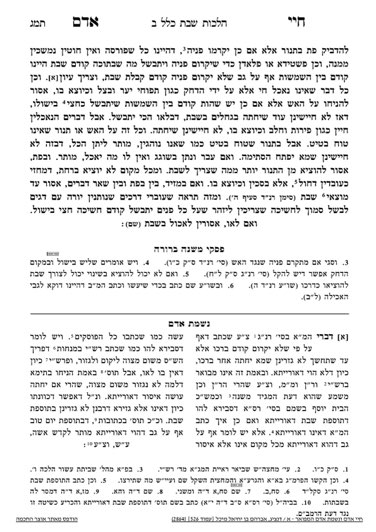We are continuing in siman 3, discussing putting up food before Shabbos to cook into Shabbos. We mentioned that foods which are edible raw are not included in the issur of shehiyah; today we will discuss this point further.
The Chayei Adam writes that food items which are eaten raw, such as fruits or milk, are not included in the issur of shehiyah. Since it is edible in its current state, Chazal were not concerned that a person would come to stir it.
We learned (S0035, S0036) that in order to avoid the issur of stirring the coals, a person could seal the source of the fire. Even though a person could theoretically unseal the source of heat, Chazal assumed that by the time a person goes through the process of unsealing the source of heat, they will remember it is Shabbos.
Regarding our modern ovens, in theory, if there were a way to seal the source of heat, this would apply as well. However, because our “stirring” takes place with the knobs and dials of the oven, sealing the oven does not remove the concern, because one can still turn the knob.
Next, the Chayei Adam discusses the halacha if a person does not follow Chazal, and puts food up on erev Shabbos in a way that violates the issur of shehiyah. Even if they did not end up stirring the coals, the person did not listen to Chazal. Therefore, if it was a shogeig, (either they did not know the halacha, or they forgot the halacha), if they do not have any other food, it is muttar to eat it. If they did it b’meizid, Chazal instituted a fine, and forbade the person from consuming the food until motzei Shabbos.
To review, we are not discussing a case in which one put up food to cook on Shabbos itself, which is significantly more serious. Rather, we are discussing food put up before Shabbos but in a manner in which there is a concern for shehiyah.
In between the halachos of one who violates shehiyah, the Chayei Adam discusses removing bread from the oven on Shabbos. In the times of Chazal, bread was baked by placing the dough directly on the oven walls. Since it is no longer relevant to us, we will skip it.
The Chayei Adam has not yet discussed the possibility of covering over the coals, or knobs in our modern equivalent. We will clarify these halachos in the next shiur, be’ezras Hashem.
Summary
- The issur of shehiyah only applies to foods which are inedible raw or edible raw with difficulty. If the food is edible raw, there is no issue regarding shehiyah.
- If one puts up food on erev Shabbos in a manner which violates shehiyah, if it is done b’shogeig, it can only be eaten if the person has no other food. If it was done b’meizid, it cannot be eaten until after Shabbos.



